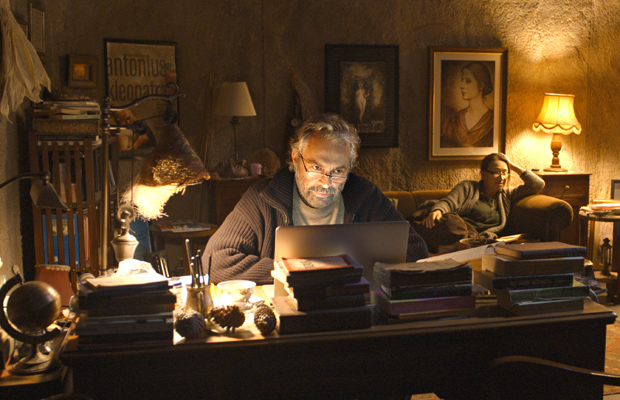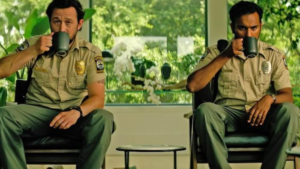Reviewed by GREG KING
Director: Nuri Bilge Ceylan
Stars: Haluk Bilginer, Melisa Sozer, Demet Akbag, Nejat Ilser.
 Turkish director Nuri Bilge Ceylan has almost singlehandedly revitalised the Turkish film industry. His international reputation was cemented by the acclaim lavished on his films at the Cannes Film Festival over the years. However his rigorously constructed dramas are decidedly art house in nature and of limited appeal to mainstream audiences. His previous film was the soporific police procedural Once Upon A Time In Anatolia; his latest film is the bleak Winter Sleep, which seems sure to similarly divide audiences. It comes with the cachet of having won the prestigious Palme D’Or at Cannes this year, but it seems that the jury has awarded his achievement rather than a great piece of cinema.
Turkish director Nuri Bilge Ceylan has almost singlehandedly revitalised the Turkish film industry. His international reputation was cemented by the acclaim lavished on his films at the Cannes Film Festival over the years. However his rigorously constructed dramas are decidedly art house in nature and of limited appeal to mainstream audiences. His previous film was the soporific police procedural Once Upon A Time In Anatolia; his latest film is the bleak Winter Sleep, which seems sure to similarly divide audiences. It comes with the cachet of having won the prestigious Palme D’Or at Cannes this year, but it seems that the jury has awarded his achievement rather than a great piece of cinema.
Winter Sleep is a meandering and languorously paced 196-minute drama that will prove a challenge and a chore for many unfamiliar with Ceylan’s style and understated approach. The film’s inordinately lengthy running time could easily have been trimmed back to make it more accessible and less bum numbing.
Co-written by Ceylan and his wife Ebru Ceylan, Winter Sleep is a character study and it also an understated exploration of a marriage in crisis. It is strictly minimalist in its staging and the film unfolds largely as a series of long, extended conversations that are full of dense dialogue that is oblique, intellectual and philosophical in nature.
The central character here is Aydin (played by Turkish actor Haluk Bilginer, who has extensive experience on the London stage), a former actor who runs a small hotel in the Cappadonia region of central Anatolia with his younger wife Nihal (Melisa Sozen) and his recently divorced sister Necla (Demet Akbag). Despite his wealth though Aydin is an overbearing, tyrannical and unforgiving misanthrope full of contempt and bitterness and critical of those around him. He is also a tough landlord who is in dispute with some of his tenants who are late in paying their rent. Chief amongst them is Ismael (Nejat Ilser). Nihal’s offer to try and help him and his family, without her husband’s knowledge, though is rebuffed.
Nihal is involved in many charitable activities, but Aydin is dismissive of her endeavours. She describes him as unbearable, selfish, spiteful and cynical.
The film unfolds in a series of long conversations between Aydin and Nihal and Aydin and Necla, that reveal some simmering resentments, bruised pride and concepts of honour and respect. Ceylan slowly peels back the layers of Aydin’s character to reveal his flaws and expose his pretentious nature. But these conversations are also too long and intellectual to hold the interest for long.
Ceylan has shot these scenes in long takes and close up which is supposed to add intimacy and emotion to them. These scenes are almost theatrical in their staging. Ceylan’s regular cinematographer Gokhan Tiryaki has used natural lighting for the interior shots which brings a somewhat bleak and ominous mood to the material. Tiryaki has also opened the film up for a couple of scenes to capture the beautiful vistas of the region, and admittedly the widescreen lensing is superb.
There is also a beautiful sequence in which Aydin chases down a wild horse, but it adds little to the film overall. This, along with a scene in which Aydin shoots a rabbit, are what passes for action in the dialogue heavy film.
Ceylan is interested in exploring the dichotomy that exists in contemporary Turkey, the gap between the rich and the poor and the difference in values between modern Turkey and the remote rural areas seemingly stuck in the past and with a more simple view of life. His approach to the material though is rather understated. There are numerous literary references throughout the film, with allusions to the likes of Shakespeare and Chekhov.
The rather ambiguous and abrupt ending may also prove a turn off for many who have endured the three hours in anticipation of some huge moment of drama and emotional payoff. Winter Sleep will have many who champion its style and intellectual rigour, but there will also be many who will find the prospect of sitting through this film something of a chore.
★☆



